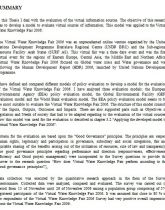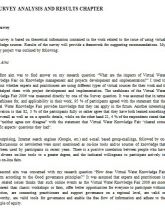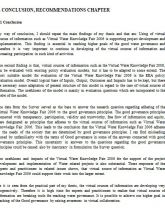Hľadaj
Zobraz:
Univerzity
Kategórie
Rozšírené vyhľadávanie
45 113
projektov
Home » Skriptá » Evaluating virtual information sources: the case of the Virtual Water Knowledge Fair
Evaluating virtual information sources: the case of the Virtual Water Knowledge Fair
| Prípona .doc |
Typ skriptá |
Stiahnuté 1 x |
| Veľkosť 2,6 MB |
Jazyk anglický |
ID projektu 11077 |
| Posledná úprava 29.10.2018 |
Zobrazené 832 x |
Autor: - |
 Zdieľaj na Facebooku
Zdieľaj na Facebooku |
||
| Detaily projektu | ||
- cena:
30 Kreditov - kvalita:
76,9% -
Stiahni
- Pridaj na porovnanie
- Univerzita:-
- Fakulta:-
- Kategória:Technika » Informatika
- Predmet:-
- Študijný program:-
- Ročník:-
- Formát:MS Office Word (.doc)
- Rozsah A4:69 strán
- Dokumentácia:Stiahni
In this Thesis I deal with the evaluation of the virtual information sources. The objective of this research was to develop a model to evaluate virtual sources of information. This model was applied to the Virtual Water Knowledge Fair 2006.
The Virtual Water Knowledge Fair 2006 was an unprecedented online venture organized by the United Nations Development Programme Bratislava Regional Centre (UNDP BRC) and the Sub-regional Resource Facility Arab States (SURF AS). This virtual fair was a three days event and was the first virtual event for the regions of Eastern Europe, Central Asia, the Middle East and Northern Africa. Virtual Water Knowledge Fair 2006 focused on Global water crisis and Water governance and was following the Human Development Report (HDR) 2006, launched by United Nations Development Programme.
I have defined and compared different models of policy evaluation to develop a model for the evaluation of the Virtual Water Knowledge Fair 2006. I have analyzed three evaluation models: the European Environmental Agency (EEA) policy evaluation model, the Global Environmental Facility (GEF) evaluation model and the World Bank evaluation model. The EEA policy evaluation model seems to be the most suitable to evaluate the Virtual Water Knowledge Fair 2006. The structure of this model consists of the Inputs, Outputs, Outcomes and Impacts. There are also supported parts such as Objectives of legislation and Needs of society that had to be adapted regarding to the evaluation of the virtual sources. How this model was used for the evaluation is described in chapter 3.2 “Applying the developed model to Virtual Water Knowledge Fair 2006”.
Criteria for the evaluation are based upon the “Good Governance” principles. The principles are: respect human rights, legitimacy and participation in governance, subsidiary and social integration, fair and equitable sharing of the benefits arising out of the utilization of resources, rule of law and transparency. The good governance principles regarding performance and direction (responsiveness, effectiveness, efficiency and Good project management) were incorporated to the Survey questions to provide the answer to the research question “How does Virtual Water Knowledge Fair perform according to the Good governance principles?”.
Data collection was executed by the quantitative research approach in the form of the Survey questionnaire. Collected data were analyzed, compared and evaluated. The survey was carried out in period from 15 of November until 26 of November 2006 among a population group comprising of 576 registered participants of the Virtual Water Knowledge Fair 2006. It was assumed that close to 80 % of the respondents of the Virtual Water Knowledge Fair 2006 Survey had very positive overall impression about the Virtual Water Knowledge Fair 2006.
The Virtual Water Knowledge Fair 2006 enabled long-term collaboration of water professionals around the world, the exchange of good practices and the establishment of new partnerships. The results of the evaluation of the Virtual Water Knowledge Fair 2006 are showing that this virtual event is leading to the broadening of the horizons, enabling the exchange of experiences and ideas, showcasing some of the innovative approaches to water governance and finally to the reaching of the good water governance.
The Virtual Water Knowledge Fair 2006 was an unprecedented online venture organized by the United Nations Development Programme Bratislava Regional Centre (UNDP BRC) and the Sub-regional Resource Facility Arab States (SURF AS). This virtual fair was a three days event and was the first virtual event for the regions of Eastern Europe, Central Asia, the Middle East and Northern Africa. Virtual Water Knowledge Fair 2006 focused on Global water crisis and Water governance and was following the Human Development Report (HDR) 2006, launched by United Nations Development Programme.
I have defined and compared different models of policy evaluation to develop a model for the evaluation of the Virtual Water Knowledge Fair 2006. I have analyzed three evaluation models: the European Environmental Agency (EEA) policy evaluation model, the Global Environmental Facility (GEF) evaluation model and the World Bank evaluation model. The EEA policy evaluation model seems to be the most suitable to evaluate the Virtual Water Knowledge Fair 2006. The structure of this model consists of the Inputs, Outputs, Outcomes and Impacts. There are also supported parts such as Objectives of legislation and Needs of society that had to be adapted regarding to the evaluation of the virtual sources. How this model was used for the evaluation is described in chapter 3.2 “Applying the developed model to Virtual Water Knowledge Fair 2006”.
Criteria for the evaluation are based upon the “Good Governance” principles. The principles are: respect human rights, legitimacy and participation in governance, subsidiary and social integration, fair and equitable sharing of the benefits arising out of the utilization of resources, rule of law and transparency. The good governance principles regarding performance and direction (responsiveness, effectiveness, efficiency and Good project management) were incorporated to the Survey questions to provide the answer to the research question “How does Virtual Water Knowledge Fair perform according to the Good governance principles?”.
Data collection was executed by the quantitative research approach in the form of the Survey questionnaire. Collected data were analyzed, compared and evaluated. The survey was carried out in period from 15 of November until 26 of November 2006 among a population group comprising of 576 registered participants of the Virtual Water Knowledge Fair 2006. It was assumed that close to 80 % of the respondents of the Virtual Water Knowledge Fair 2006 Survey had very positive overall impression about the Virtual Water Knowledge Fair 2006.
The Virtual Water Knowledge Fair 2006 enabled long-term collaboration of water professionals around the world, the exchange of good practices and the establishment of new partnerships. The results of the evaluation of the Virtual Water Knowledge Fair 2006 are showing that this virtual event is leading to the broadening of the horizons, enabling the exchange of experiences and ideas, showcasing some of the innovative approaches to water governance and finally to the reaching of the good water governance.
Kľúčové slová:
Environmental policy
Virtual sources of information
United Nations Development Programme
European Environmental Agency
Global Environmental Facility
World Bank
Obsah:
- SUMMARY 3
TABLE OF CONTENTS 5
FOREWORD 7
ABBREVIATIONS 9
1. INTRODUCTION TO MY RESEARCH 11
1.1 Introduction 11
1.2 Research questions 12
1.3 Outline of the Thesis 12
1.4 Description of the Virtual Water Knowledge Fair 2006 13
2. POLICY EVALUATION CHAPTER 17
2.1 Introduction 17
2.2 Policy evaluation models 18
2.2.1 Identification of the Policy evaluation models 18
2.2.2. European Environmental Agency (EEA) policy evaluation model 18
2.2.3. Global Environmental Facility (GEF) evaluation model 20
2.2.4. World Bank evaluation model 23
2.3 Identifying the most suitable model for evaluation of the Virtual portals of information 25
2.3.1 Identifying the criteria of evaluation and the evaluation questions 26
2.4 Good governance principles in relation to the evaluation of the Virtual Water Knowledge Fair 2006 28
3. CASE OF VIRTUAL WATER KNOWLEDGE FAIR 2006 CHAPTER 31
3.1 Methodology and research approach 31
3.1.1 Research methodology 31
3.1.2 Organization of the data collection 31
3.2 Applying the developed model to Virtual Water Knowledge Fair 2006 32
3.2.1 Inputs 32
3.2.2 Outputs 34
3.2.3 Outcomes 35
3.2.4 Impacts 37
4. SURVEY ANALYSIS AND RESULTS CHAPTER 39
4.1 Survey 39
4.1.1 Aims 39
4.2 Analysis and Results 41
4.2.1 Personal information 41
4.2.2 Overall Evaluation of Virtual Water Knowledge Fair 2006 45
4.2.3 Relation of Virtual Water Knowledge Fair 2006 to principles of good governance 50
4.2.4 The possibilities for improvement and participation in Virtual Water Knowledge Fair 2006 52
5. CONCLUSION, RECOMMENDATIONS CHAPTER 55
5.1 Conclusion 55
5.2 Discussion 56
5.3 Recommendations 56
REFERENCES 59
SUPPLEMENTS 63







